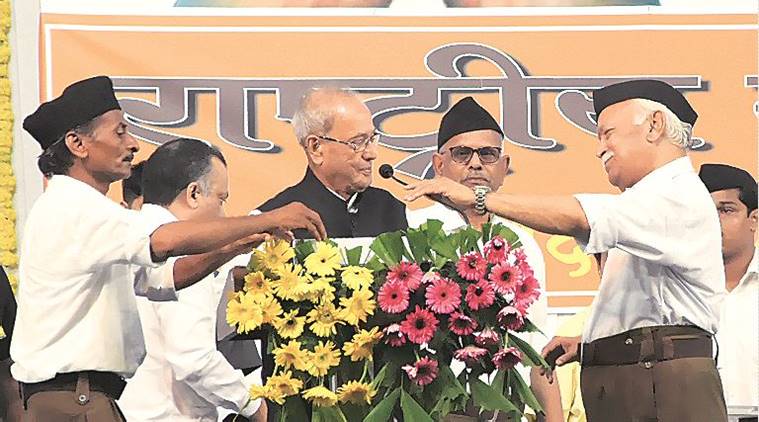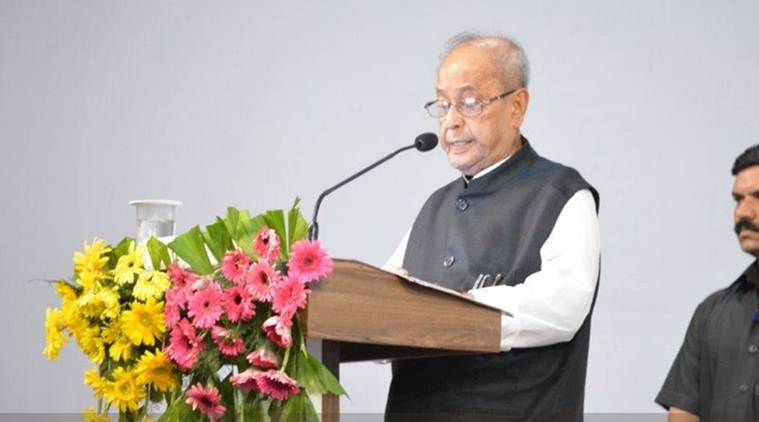 Former president Pranab Mukherjee with RSS chief Mohan Bhagwat at the closing ceremony of ‘Tritiya Varsha Sangh Shiksha Varg’ in Nagpur. (Photo: Monica Chaturvedi)
Former president Pranab Mukherjee with RSS chief Mohan Bhagwat at the closing ceremony of ‘Tritiya Varsha Sangh Shiksha Varg’ in Nagpur. (Photo: Monica Chaturvedi)
Former President Pranab Mukherjee, addressing RSS swayamsevaks at their headquarters in Nagpur Thursday, said “any attempt at defining our nationhood in terms of dogmas and identities of religion, region, hatred and intolerance will only lead to dilution of our national identity”.
Underlining that “multiplicity in culture, faith and language is what makes India special” and “we derive our strength from tolerance”, Mukherjee told the gathering which included RSS Sarsanghachalak Mohan Bhagwat: “The soul of India resides in pluralism and tolerance… Secularism and inclusion are a matter of faith for us… India’s nationhood is not one language, one religion, one enemy. It is the perennial universalism of 1.3 billion people who use more than 122 languages and 1,600 dialects in their everyday lives, practice 7 major religions… live under one system, one flag and one identity of being Bharatiya and have no enemies.”
“For us, democracy is not a gift, but a sacred trust… From our Constitution flows our nationalism. The construct of Indian nationalism is Constitutional patriotism which consists of an appreciation of our inherited and shared diversity; a readiness to enact one’s citizenship at different levels; the ability to self-correct and learn from others.”
 Former President Pranab Mukherjee at the RSS headquarters in Nagpur on Thursday. (Twitter/@RSSorg)
Former President Pranab Mukherjee at the RSS headquarters in Nagpur on Thursday. (Twitter/@RSSorg)
Emphasising that “dialogue is necessary not only to balance the competing interests but also to reconcile them”, Mukherjee said: “We may argue, we may agree, or we may not agree. But we cannot deny the essential prevalence of multiplicity of opinion. Only through a dialogue can we develop the understanding to solve complex problems…”
He referred to what he called “manifestations of rage” that were “tearing our social fabric” and said “we must free our public discourse from all forms of violence, physical as well as verbal. Only a non-violent society can ensure the participation of all sections of people in the democratic process, especially the marginalised and the dispossessed”.
Recalling Indian history from the 6th century BC\ that saw the emergence of the Indian State in the Mahajanapadas to the rules of different dynasties, Muslim invaders, East India Company and the British Empire. Mukherjee pointed out: “Each conqueror and each foreign element had been absorbed to form a new synthesis and unity. Tagore in his poem Bharat Teertha says and I quote: ‘No one knows at whose beckoning call how many streams of humanity came in indomitable waves from all over the world, over the millennia and mingled like rivers, into this vast ocean and created an individual soul, that is called Bharat’.”
 Pranab Mukherjee and Mohan Bhagwat at Hedgewar Residence in Nagpur. (Express Photo by Monica)
Pranab Mukherjee and Mohan Bhagwat at Hedgewar Residence in Nagpur. (Express Photo by Monica)
“This nation and nationalism was not bound by geography, language, religion, or race. As Gandhiji explained, Indian nationalism was not exclusive, nor aggressive, nor destructive. It was this nationalism that Pandit Jawaharlal Nehru so vividly expressed in the Discovery of India, and I quote, “I am convinced that nationalism can only come out of the ideological fusion of Hindu, Muslim, Sikh and other groups in India. That does not mean that extinction of any real culture of any group, but it does mean a common national outlook, to which other matters are subordinated,” he said.
Earlier, Mukherjee described RSS founding Sarsanghachalak Keshav Baliram Hedgewar as a “great son of Mother India” when he visited his birthplace in Nagpur.
“Today I came here to pay my respect and homage to a great son of Mother India,” Mukherjee wrote in the visitor’s book at Hedgewar’s birthplace.